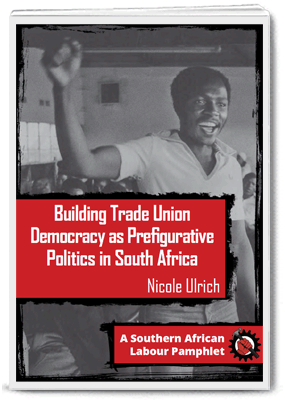 In examining the possibilities for politics within and at a distance from the state, it is important to revisit the democratic traditions of the working class, which are often learned through struggles and strikes – and which were exemplified by the new unions of the 1970s and 1980s. Not much of this alternative tradition of democracy outside the state has been captured in official histories, which present the attainment of democracy in terms of the formation of a parliamentary government in 1994.
In examining the possibilities for politics within and at a distance from the state, it is important to revisit the democratic traditions of the working class, which are often learned through struggles and strikes – and which were exemplified by the new unions of the 1970s and 1980s. Not much of this alternative tradition of democracy outside the state has been captured in official histories, which present the attainment of democracy in terms of the formation of a parliamentary government in 1994.
There is a larger problem here of how the working-class heritage – the intellectual and organisational and political traditions of labour and the left – has been side-lined in media, textbooks, monuments and narratives; this also involves a narrowing of our political imagination, with our view of “democracy” itself narrowed dramatically. There has been a focus on elections and political parties and electoral politics. This reflects and reinforces a view that assumes a separation of the political – basically left to the state and the parties – and the economic – issues like wage negotiations are left to unions, and union involvement in politics is increasingly reduced to lobbying political parties.
Download PDF here